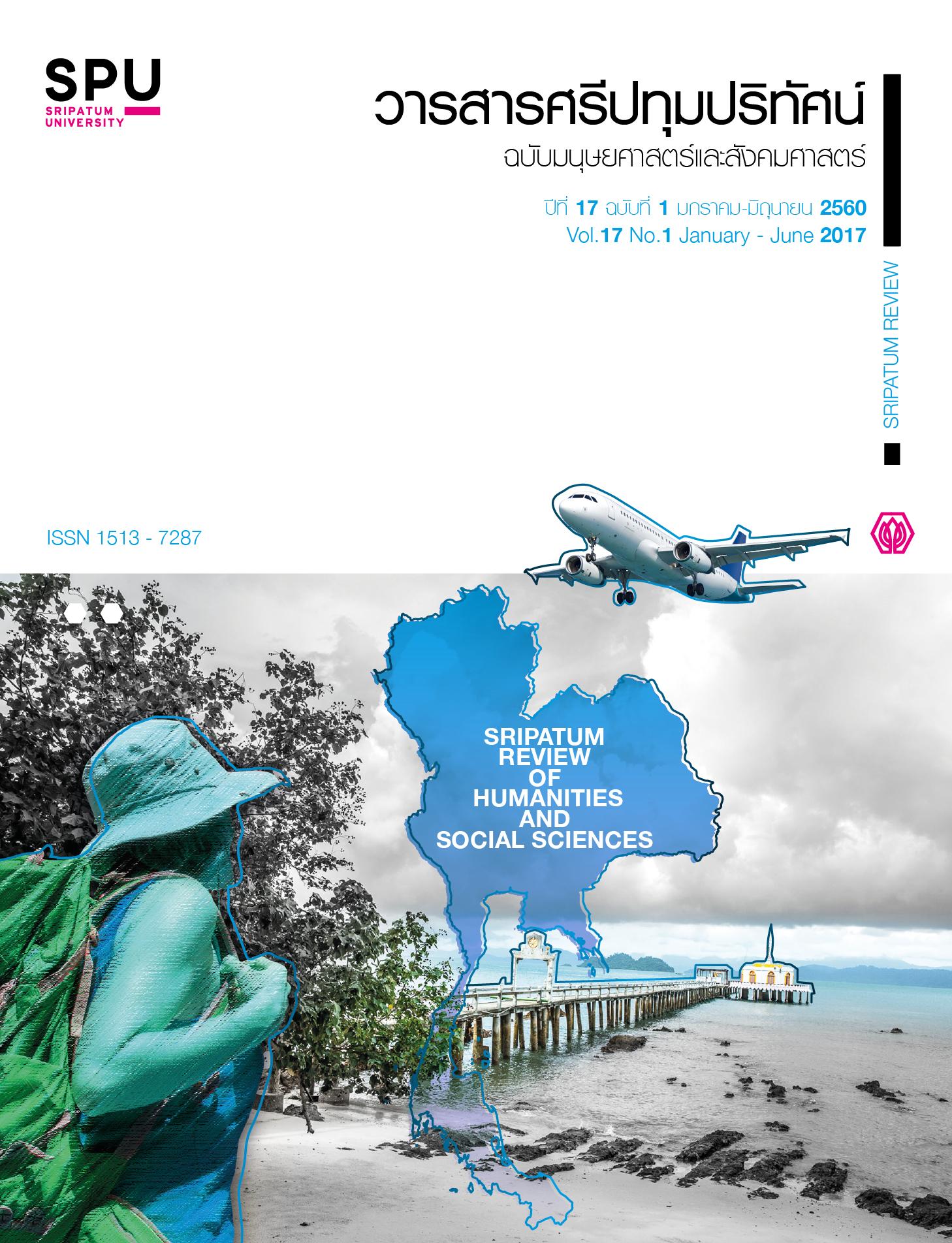DETERMINANTS OF STAKEHOLDER PARTICIPATION TOWARDS SUSTAINABLE TOURISM DEVELOPMENT: AN EMPIRICAL STUDY OF ACTIVE BEACH DESTINATIONS IN THAILAND
Main Article Content
Abstract
Objectives of this research are: (1) to identify the key stakeholders involving with the local government organizations in sustainable tourism development (STD); (2) to explore key determinants of stakeholder participation in STD activities; and (3) to formulate recommendations on how to enhance stakeholder participation initiated by local government organizations. The results indicated that the key stakeholders were those who possess at least two attributes of power and legitimacy while social capital and political trust or distrust were key determinants influencing participation of both key and relevant stakeholders. An interesting finding in this research was the local government trustworthiness as the mediator variable that linked the relationship between social and political trusts. The recommendations for local government organizations are to enhance trustworthiness through transparency and accountability, to create social capital networks involving various stakeholder groups, and to promote public awareness on benefits of participation among local residents.
Article Details
1. กองบรรณาธิการสงวนสิทธิ์ในการพิจารณาและตัดสินการตีพิมพ์บทความในวารสาร
2. บทความทุกเรื่องจะได้รับการตรวจสอบทางวิชาการโดยผู้ทรงคุณวุฒิ แต่ข้อความและเนื้อหาในบทความที่ตีพิมพ์เป็นความรับผิดชอบของผู้เขียนแต่เพียงผู้เดียว มิใช่ความคิดเห็นและความรับผิดชอบของมหาวิทยาลัยศรีปทุม
3. การคัดลอกอ้างอิงต้องดำเนินการตามการปฏิบัติในหมู่นักวิชาการโดยทั่วไป และสอดคล้องกับกฎหมายที่เกี่ยวข้อง
References
in Vienna, Austria. United Nations.
Bramwell, B., and Sharman, A. 1999. Collaboration in local tourism policymaking. Annals of Tourism Research. 26(2): 392-415.
Bramwell, B., and Lane, B., eds. 2000. Tourism collaboration and partnerships: Politics, Practice and Sustainability. Channel View Publications: Clevedon, Buffalo, Toronto, Sydney.
Byrd, E. T. 2007. Stakeholders in sustainable tourism development and their roles: applying stakeholder theory to sustainable tourism development. Tourism Review. 62(2): 6-13.
Byrd, E. T., Cárdenas, D. A., and Greenwood, J. B. 2008. Factors of stakeholder understanding
of tourism: The case of Eastern North Carolina. Tourism and Hospitality Research. 8(3):192-204.
Chardchawarn, S. 2010. Local Governance: The Politics of Decentralization and the Role of Bureaucrats, Politicians, and the People.VRF Series. Chiba: Institute of Developing Economies, Japan External Trade Organization.
Creswell, J. W. 1998. Qualitative inquiry and research design: Choosing among five traditions. Thousand Oaks, CA: SAGE Publications.
Creswell, J. W. 2003. Research design: Qualitative, quantitative and mixed methods approaches. 2 nd edition. Thousand Oaks, CA: SAGE Publications.
Dwyer, L., and Edwards, D. 2010. “Sustainable Tourism Planning”. In Liburd, J. J., and D. dwards(eds.),Understanding the Sustainable Development of Tourism. Oxford: Goodfellow Publishers Ltd.
Fennema, M., and Tillie, J. 1999. Political participation and political trust in Amsterdam. Civic communities and ethnic networks. Journal of Ethnic and Migration Studies. 25(4): 703-726.
Field, John. 2008. Social capital. 2 nd edition.New York: Routledge.Finifter, A. W. 1970. imensions of political alienation.American Political Science Review. 64: 389-410.
Fiorino, D. J. 1990. Citizen participation and environmental risk: A survey of institutional echanisms.Science, Technology, and Human Values. 15(2): 226-243.
Freeman, E. R. 1984. Strategic management: A stakeholder approach. Boston: Pitman.
Fukuyama, F. 1995. Trust: The Social Virtues and the Creation of Prosperity. New York: Basic Books.
Gamson, W. 1975. The strategy of social protest.Homewood, II.: Dorsey Press.
Harris, J. M. 2003. Sustainability and sustainable development. In International Society for Ecological Economics. Retrieved July 31, 2013 from www.isecoeco.org/pdf/ susdev.pdf
Hidayah, Z., Rosyid, D. M., and Armono, D. A. 2016.Planning for sustainable small island management: case study of Gili Timur Island East Java Province, Indonesia. Procedia - Social and Behavioral Sciences. 227: 785-790.
Holliday, A. 2002. Doing and Writing Qualitative Research. California: SAGE Publications Ltd.
Hood, C. 2006. “Beyond exchanging first principles?Some closing comments”. In Transparency:
The key to better governance?, C. Hood, and D. Heald. (eds.). Oxford: Oxford University Press.
Hwang, D. 2012. Influencing of social capital on community-based action in tourism development: A study of social network analysis. Doctoral dissertation, University of Illinois at Urbana-Champaign, USA.
Levi, M. 1997. Consent, Dissent and Patriotism. New York: Cambridge University Press.
Levi, M., and Stoker, L. 2000. Political trust and Trustworthiness. Annual Review of
Liu, Z. 2003. Sustainable tourism development: A critique. Journal of Sustainable Tourism.
11(6): 459-475.
Mitchell, R. K., Agle, B. R., and Wood, D. J. 1997. Toward a theory of stakeholder identification and salience: Defining the principle of who and what really counts. The Academy of Management Review. 22(4): 853-886.
Newton, K. 2001. Trust, Social Capital, Civil Society,and Democracy. International Political
Science Review. 22(2): 201-214.
Ng, S. I., Chia, et al. 2017. Seeking tourism sustainability - A case study of Tioman Island,
Malaysia. Tourism Management. 58: 101-107.
Putnam, R. D. 1993. Making Democracy Work:Civic traditions in modern Italy. New Jersey:Princeton University Press.
Putnam, R. D. 1995. Blowing alone: America’s declining social capital. Journal of Democracy. 6(1): 65-78.
Pongponrat, K., and Chantradon, N. J. 2012. Mechanism of social capital in community tourism
participatory planning in Samui Island, Thailand.TOURISMOS. 7(1): 339-349.
Simmons, D. G. 1994. Community participation in tourism planning. Tourism management.
15(2): 98-108.
Sutawa, G. K.. 2012. Issues on Bali tourism development and community empowerment to support sustainable tourism development. Procedia Economics and Finance. 4: 413-422.
The American Heritage College Dictionary. 2004.4th edition. New York: Houghton Mifflin ompany.Tsaur, S., and Wang, C. The evaluation of sustainable tourism development by analytical hierarchy process and fuzzy set theory: An empirical study on the green island in Taiwan. 2007. Asia Pacific Journal of Tourism Research.12(2): 127-145.
UNEP and WTO. 2005. Making tourism more sustainable:A guide for policy makers. Publications of UNEP.
WCED. 1987. Our Common Future. Oxford: Oxford University Press.
World Economic Forum. 2015. Travel & Tourism Competitiveness Report 2015. Geneva:
Publication of World Economic Forum.
Yin, R. K. 2009. Case Study Research: Design and Methods. 4 th edition. California: SAGE
Publications Ltd.
Yin, R. K. 2012. Application of Case Study Research. 3rd edition. India: SAGE Publications Ltd.
Yin, R. K. 2014. Case Study Research: Design and Methods. 5 th edition. California: SAGE
Publications Ltd.
Zhang, S. 2010. The relationships between social capital and economic well-being: An individual level analysis. Doctoral dissertation, University of Illinois at Urbana-Champaign, USA.


